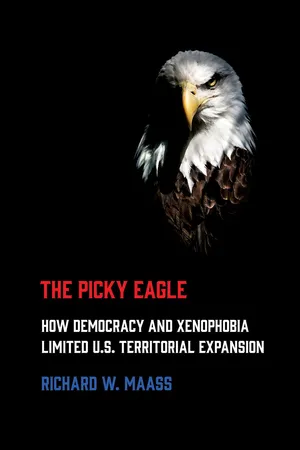Politics & International Relations
Expansionist Nationalism
Expansionist nationalism refers to a political ideology that advocates for the expansion of a nation's territory, influence, or power. It often involves the belief in the superiority of one's own nation and the desire to assert dominance over other nations through territorial expansion, colonization, or military conquest. This ideology has historically led to conflicts and imperialism as nations sought to expand their borders and influence.
Written by Perlego with AI-assistance
Related key terms
4 Key excerpts on "Expansionist Nationalism"
- eBook - ePub
Politics and Strategy
Partisan Ambition and American Statecraft
- Peter Trubowitz(Author)
- 2011(Publication Date)
- Princeton University Press(Publisher)
CHAPTER FOUR When States Expand W HY DO STATES SEEK TO EXPAND their political influence abroad? Realists of various persuasions argue that the explanation lies in the international system and the uncertainty its anarchical structure creates for statesmen. As a state’s power (meaning its material resources) relative to that of other nations increases, so will its desire to extend its political influence and control internationally—to do what it can, militarily, economically, and diplomatically to enhance its security in an uncertain world (Krasner, 1978; Gilpin, 1981; Zakaria, 1998). Robert Gilpin (1981, 94) calls this the “realist law of uneven growth” and argues that it is the central dynamic of international politics. In order to increase their own security, growing states will actively seek to change their international environment in ways that will offer them greater political, economic, and territorial control. In the realist model, expansionism has little to do with leaders’ own political ambitions, or with the interests of their partisans. Leaders expand abroad because they can and when they can, not when it pays domestically for them to do so. T HEORIES OF E XPANSIONISM In this chapter, I argue that foreign ambition cannot be easily divorced from leaders’ political self-interest. Expansionist foreign policies aim at extending a nation’s geopolitical reach and political control beyond its borders. These efforts can take the classic form of imperial conquest and subjugation of foreign peoples, but there are also other, less formal methods of expansion. Leaders can create protectorates, annex contiguous territories, build military bases, or establish spheres of influence. I argue that leaders are mostly likely to pursue such expansionist goals when they enjoy geopolitical slack and when expansionism pays domestically. I show that increased military power does give leaders greater flexibility or latitude in deciding where and how to use that power - eBook - ePub
Reassessing Political Ideologies
The Durability of Dissent
- Michael Freeden(Author)
- 2004(Publication Date)
- Routledge(Publisher)
However, two additional factors in recent years have highlighted the profile of nationalism in contemporary politics. Paradoxically, most current positive claims for nationalism now acknowledge that it embodies a cluster of perspectives. In this sense, it is accepted by most proponents of twentieth-century nationalism that there are ideological variations, both civic and liberal-minded as well as racist, insular and bellicose forms. These complex variants were not envisaged by the early- to mid-nineteenth-century ideologists of nationalism. Thus, nationalist ideology in the twentieth century appears as a much more varied and complex pattern of thought than previously imagined. Secondly, many have also seen a link between forms of nationalism and liberal ideological values like freedom, democracy and popular sovereignty. Consequently, since the collapse of the Berlin wall in 1989, and the changing political landscape of international and domestic politics, there has been once again a surge of theoretical and practical interest in nationalism in the Western academic environment. Not only are vast amounts being written about it, from both empirical and ideological perspectives, but it has once again become a central player in world politics. The fundamental flaw and problem in this post-1989 post-communist interest in nationalism is that very little of it has been civic or liberal in practice. If anything, the bulk of the nationalism seen, for example, in Europe in the last decade has been quite markedly insular and deeply xenophobic in character. This historical practice thus runs totally contrary to much of the more optimistic liberal-minded academic writing about nationalism.However, this is but one of a number of deep paradoxes running through nationalist ideology in the twentieth century. Historically, nationalism is a comparatively recent historical phenomenon. Conversely, one of its central substantive claims has been its longevity and antiquity. Further, nationalists often identify the roots of nationalism within nature. This arises out of the semantics of the word nation. Yet it is clear from even the most cursory study of the subject that nationalism is a comparatively modern artefact. In fact, for some, nationalism equates with modernity. It is largely a phenomenon of the late nineteenth and twentieth centuries. In addition, nationalism is in the peculiar position of claiming a universality for its ideas, yet the ideology only makes sense in terms of its particularity and localism. Finally, and most significantly, there is the problem of, on the one hand, the immense power of nationalism in this and the last century in the actual practice of politics, coupled with, on the other hand, nationalism's oft remarked theoretical naivety. These paradoxes appear throughout this essay. - eBook - ePub
The Importance of Being Civil
The Struggle for Political Decency
- John Hall(Author)
- 2013(Publication Date)
- Princeton University Press(Publisher)
CHAPTER 10 Imperialism, the Perversion of Nationalism John Hobson’s celebrated Imperialism: A Study begins with striking thoughts about the relationships between nationalism and imperialism. The novelty of the recent Imperialism regarded as a policy consists chiefly in its adoption by several nations. The notion of a number of competing empires is essentially modern. The root idea of empire in the ancient and medieval world was that of a federation of States, under a hegemony, covering in general terms the entire or recognized world, such as was held by Rome…. Thus empire was identified with internationalism, though not always based on a conception of equality of nations … the triumph of nationalism seems to have crushed the rising hope of internationalism. Yet it would appear that there is no essential antagonism between them. A true strong internationalism in form or spirit would rather imply the existence of powerful self-respecting nationalities which seek union on the basis of common national needs and interests…. Nationalism is a plain highway to internationalism, and if it manifests divergence we may well suspect a perversion of its nature and its purpose. Such a perversion is Imperialism, in which nations trespassing beyond the limits of facile assimilation transform the wholesome stimulative rivalry of varied national types into the cut-throat struggle of competing empires. 1 There is much to praise here. The ideal typical empire, especially in premodern circumstances, sought to create a world all of its own, free from competitors. 2 Such empires were “multicultural” (perhaps at times even “multinational”) to a fault, bound to diversity by weakness, lacking means to indoctrinate and to homogenize into a single mold. Nationalism and imperialism were separated from each other, making any notion of intimacy between them ridiculous. “Recent” imperialism was indeed different, seeking, in different degrees, to homogenize different peoples into a singular identity - eBook - ePub
The Picky Eagle
How Democracy and Xenophobia Limited U.S. Territorial Expansion
- Richard W. Maass(Author)
- 2020(Publication Date)
- Cornell University Press(Publisher)
In this way U.S. leaders pursued annexation throughout the nineteenth century by picking and choosing from among their potential options until they ran out of desirable targets. Congressional majorities supported presidential efforts to annex areas like Louisiana and California, but they delayed similar efforts in Florida and Texas and defeated efforts to gain more of Mexico and Cuba. Time and again they raised objections to the domestic costs of annexation, and as they crossed their remaining neighbors off their list of viable targets, the practice gradually disappeared from U.S. foreign policy. To recognize that annexation has domestic consequences and that those consequences bear on leaders’ decision making is to recognize that in international politics, as in the human diet, you are what you eat. And the United States has always been a picky eater.What Is Annexation?
Like many terms, “annexation” has often been used in vague and contradictory ways. In this book, consistent with its dictionary definition, annexation refers to the absorption of territory into a state. The most straightforward way to think about annexation is as a subset of territorial expansion, which is itself a subset of the expansion of international influence (table 1.1 ). Expansionism, or states’ pursuit of influence abroad, has attracted consistent interest from international security scholars due to its role in causing wars and shaping the international system.2 While most forms of expansionism simply aim to increase one state’s leverage over another’s policies, territorial expansion sees a state claim Westphalian sovereignty over an area beyond its previous borders, declaring itself to be the highest political authority there and proscribing foreign interventions.3 Territorial expansion may increase the state’s economic and military power more efficiently than other forms of expansionism—depending on its administrative and technological abilities to utilize its new territory—which explains why it is simultaneously a coveted foreign policy goal and a potent source of international conflict.4Territorial expansion, in turn, comes in two forms, annexation and imperialism, distinguished by whether the state fully absorbs its new territory or rules it separately and subordinately. A state in international relations, as opposed to U.S. states, is an institutional order that exercises paramount political authority and a monopoly on legitimate violence within its borders.5 Annexation expands that order by integrating new territory within its core protective, extractive, and legislative institutions. This doesn’t mean that states are internally homogeneous—no state entirely is—but rather that a state’s relationship with the annexed territory comes to mirror its relationship with its other constituent territories. By merging the new territory into the state itself, annexation enables leaders to redefine their national homeland, molding local identities, institutions, and cultural politics to reduce the likelihood of future unrest and maximize deterrent credibility in the eyes of international rivals who might desire to gain that territory for themselves.6
Learn about this page
Index pages curate the most relevant extracts from our library of academic textbooks. They’ve been created using an in-house natural language model (NLM), each adding context and meaning to key research topics.



